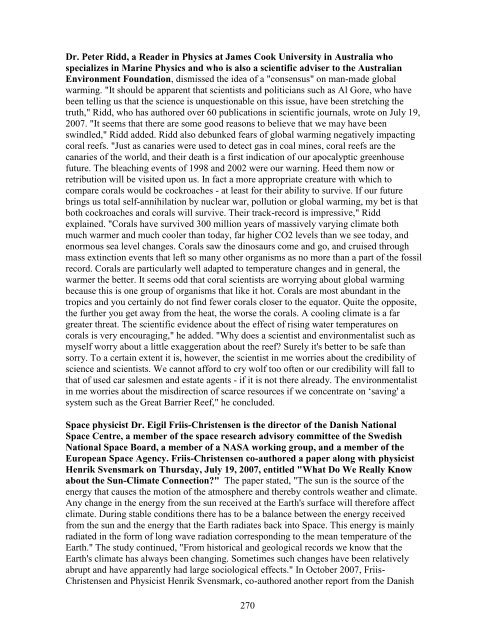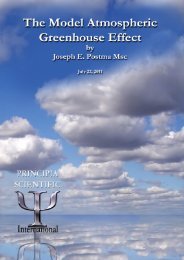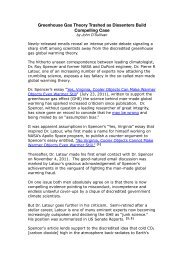Than 1000 International Scientists Dissent Over Man-Made Global ...
Than 1000 International Scientists Dissent Over Man-Made Global ...
Than 1000 International Scientists Dissent Over Man-Made Global ...
You also want an ePaper? Increase the reach of your titles
YUMPU automatically turns print PDFs into web optimized ePapers that Google loves.
Dr. Peter Ridd, a Reader in Physics at James Cook University in Australia who<br />
specializes in Marine Physics and who is also a scientific adviser to the Australian<br />
Environment Foundation, dismissed the idea of a "consensus" on man-made global<br />
warming. "It should be apparent that scientists and politicians such as Al Gore, who have<br />
been telling us that the science is unquestionable on this issue, have been stretching the<br />
truth," Ridd, who has authored over 60 publications in scientific journals, wrote on July 19,<br />
2007. "It seems that there are some good reasons to believe that we may have been<br />
swindled," Ridd added. Ridd also debunked fears of global warming negatively impacting<br />
coral reefs. "Just as canaries were used to detect gas in coal mines, coral reefs are the<br />
canaries of the world, and their death is a first indication of our apocalyptic greenhouse<br />
future. The bleaching events of 1998 and 2002 were our warning. Heed them now or<br />
retribution will be visited upon us. In fact a more appropriate creature with which to<br />
compare corals would be cockroaches - at least for their ability to survive. If our future<br />
brings us total self-annihilation by nuclear war, pollution or global warming, my bet is that<br />
both cockroaches and corals will survive. Their track-record is impressive," Ridd<br />
explained. "Corals have survived 300 million years of massively varying climate both<br />
much warmer and much cooler than today, far higher CO2 levels than we see today, and<br />
enormous sea level changes. Corals saw the dinosaurs come and go, and cruised through<br />
mass extinction events that left so many other organisms as no more than a part of the fossil<br />
record. Corals are particularly well adapted to temperature changes and in general, the<br />
warmer the better. It seems odd that coral scientists are worrying about global warming<br />
because this is one group of organisms that like it hot. Corals are most abundant in the<br />
tropics and you certainly do not find fewer corals closer to the equator. Quite the opposite,<br />
the further you get away from the heat, the worse the corals. A cooling climate is a far<br />
greater threat. The scientific evidence about the effect of rising water temperatures on<br />
corals is very encouraging," he added. "Why does a scientist and environmentalist such as<br />
myself worry about a little exaggeration about the reef? Surely it's better to be safe than<br />
sorry. To a certain extent it is, however, the scientist in me worries about the credibility of<br />
science and scientists. We cannot afford to cry wolf too often or our credibility will fall to<br />
that of used car salesmen and estate agents - if it is not there already. The environmentalist<br />
in me worries about the misdirection of scarce resources if we concentrate on ‗saving' a<br />
system such as the Great Barrier Reef," he concluded.<br />
Space physicist Dr. Eigil Friis-Christensen is the director of the Danish National<br />
Space Centre, a member of the space research advisory committee of the Swedish<br />
National Space Board, a member of a NASA working group, and a member of the<br />
European Space Agency. Friis-Christensen co-authored a paper along with physicist<br />
Henrik Svensmark on Thursday, July 19, 2007, entitled "What Do We Really Know<br />
about the Sun-Climate Connection?" The paper stated, "The sun is the source of the<br />
energy that causes the motion of the atmosphere and thereby controls weather and climate.<br />
Any change in the energy from the sun received at the Earth's surface will therefore affect<br />
climate. During stable conditions there has to be a balance between the energy received<br />
from the sun and the energy that the Earth radiates back into Space. This energy is mainly<br />
radiated in the form of long wave radiation corresponding to the mean temperature of the<br />
Earth." The study continued, "From historical and geological records we know that the<br />
Earth's climate has always been changing. Sometimes such changes have been relatively<br />
abrupt and have apparently had large sociological effects." In October 2007, Friis-<br />
Christensen and Physicist Henrik Svensmark, co-authored another report from the Danish<br />
270





